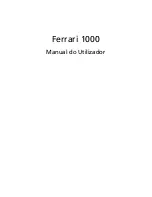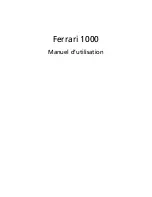
4
Gateway Solo™ 2100 Multimedia Notebook
Legal notices
Gateway Solo
™
2100 Multimedia Notebook
Gateway 2000
®
User’s Guide
610 Gateway Drive
Copyright © 1996
North Sioux City, SD 57049 USA
All rights reserved
This book is protected by copyright and all rights are
reserved. No part of it may be reproduced or transmit-
ted by any means or in any form without prior written
consent from Gateway 2000.
The information in this manual has been carefully
checked and is believed to be accurate. However,
Gateway 2000 assumes no responsibility for any
inaccuracies that may be contained in this manual. In
no event will Gateway 2000 be liable for direct,
indirect, special, incidental, or consequential damages
resulting from any defect or omission in this manual,
even if advised of the possibility of such damages.
In the interest of continued product development,
Gateway 2000 reserves the right to make improve-
ments in this manual and the products it describes at
any time, without notice or obligation.
Trademark acknowledgments
AnyKey, cow spot motif, Gateway 2000, TelePath,
stylized “G” design, and motto “You’ve got a friend in
the business” are registered trademarks of Gateway
2000. EZ Pad, EZ Point, Gateway Solo, GW2K, and
Vivitron are trademarks of Gateway 2000. Intel is a
registered trademark of Intel Corporation. Microsoft,
MS, MS-DOS, and Windows are trademarks or regis-
tered trademarks of Microsoft Corporation. All other
product names mentioned herein are used for identifi-
cation purposes only, and may be the trademarks or
registered trademarks of their respective companies.
FCC statement
Note: This equipment has been tested and found to
comply with the limits for a Class B digital device
pursuant to Part 15 of the FCC Rules. These limits are
designed to provide reasonable protection against
harmful interference in a residential installation. This
equipment generates, uses, and can radiate radio
frequency energy and, if not installed and used in
accordance with the instructions, may cause harmful
interference to radio communications. However, there is
no guarantee that interference will not occur in a
particular installation. If this equipment does cause
harmful interference to radio or television reception,
which can be determined by turning the equipment off
and on, the user is encouraged to try to correct the
interference by one or more of the following measures:
u
Reorient or relocate the receiving antenna
u
Increase the separation between the equipment
and receiver
u
Connect the equipment into an outlet on a circuit
different from that to which the receiver is con-
nected
u
Consult an experienced radio/TV technician for
help.
Caution: Changes or modifications not expressly
approved by the party responsible for compliance could
void the user’s authority to operate the equipment.
To meet FCC requirements, shielded cables are required
to connect this device to any other Class B certified
device.
INDUSTRY CANADA Notice — For the customers in Canada
This apparatus complies with the Class B limits for radio noise
emissions set out in Radio Interference Regulations.
INDUSTRIE CANADA Notice — Pour les utilisateurs au Canada
Cet appareil est conforme aux normes Classe B pourbruits
radioélectriques, spécifiés dans le Règlement sur le broullage.





































